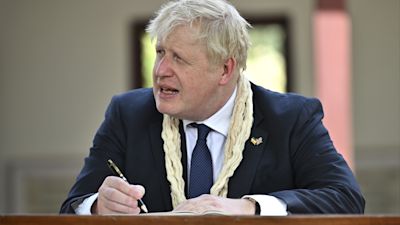All you need to know about the new partygate probe and what it means for Johnson

By ITV News Multimedia Producer Lewis Denison
MPs have agreed in a major Commons vote that Boris Johnson should be investigated by the Parliamentary Privileges Committee to confirm whether or not he broke the ministerial code.
Under the ministerial code - which has been signed by the PM - anyone in government found to have knowingly misled MPs is "expected to resign".
It comes after the prime minister was fined £50 by police for attending his 56th birthday celebration in Downing Street in June 2020, when Covid lockdown rules outlawed such gatherings.
Those critical of the PM say the fine shows he broke the code by lying to Parliament when insisting in December 2021 that he followed all the rules completely during the pandemic.
If the Privileges Committee decides he did lie to MPs it would be much harder for the prime minister to hold on to power.
What will the Privileges Committee investigate?
Labour's motion asks the committee to consider whether Mr Johnson's conduct, in claiming he obeyed coronavirus regulations, "amounted to a contempt of the House".
The motion highlights comments Mr Johnson made in the Commons on December 1 and 8, 2021.
The comments from Mr Johnson include:
An assurance "that all guidance was followed in No 10"
"I have been repeatedly assured since these allegations emerged that there was no party and that no Covid rules were broken"
"I am sickened myself and furious about that, but I repeat what I have said to him: I have been repeatedly assured that the rules were not broken"
"The guidance was followed and the rules were followed at all times".
The investigation will not begin until the police investigation concludes and Sue Gray publishes her full report on government partying during the pandemic.
The committee has the power to summon reports and documents, meaning MPs could request a full version of senior civil servant Ms Gray’s inquiry into lockdown breaches as well as photographic evidence.
How could it benefit the opposition?
Labour, the Lib Dems and other minority parties will be noting the positions taken by Tory MPs in the standards debate and will use them to attack the Conservative Party in campaigns for local elections, set for May 5.
Any MP who supports the prime minister would leave themselves open to attacks claiming they want him to avoid scrutiny.
A Labour source said: "Any Conservative MP considering voting to block this investigation would be voting for a cover up."
'Really damaging': Robert Peston explains why a series of investigations have so badly undermined the PM's position with his party
The Privileges Committee investigation would also prolong Mr Johnson's suffering over the partygate allegations as the saga will continue to play out in the news.
It would be the third investigation the prime minister has faced into his conduct during the pandemic following the initial Gray inquiry and the subsequent police probe which has so far resulted in him being fined.
For a sitting prime minister to face three separate investigations would be unprecedented and would provide the opposition with ammunition at the next general election, should Mr Johnson remain in post, something he pledged when speaking to ITV News on Thursday.
What can the Privileges Committee do? Could Boris Johnson be expelled from Parliament?
If the vote passes at some point in the future, the Privileges Committee would investigate whether Mr Johnson committed contempt of Parliament by misleading the House, a charge which once upon a time could have resulted in a prison sentence.
The power to imprison - or fine - has not been used by Parliament in well over 100 years but there are some severe sanctions the Privileges Committee could recommend.
It could say Mr Johnson should be suspended from Parliament, or even expelled if it takes a critical enough view of his conduct.
If he is expelled from Parliament we would cease to be an MP, however he would not be banned from running for election again.
If he's suspended for more than two weeks he would face a recall petition which could result in him defending his seat at a by-election.
If 10% of his constituency backs a recall petition it would trigger a by-election.
However, all of this is unlikely because Mr Johnson's Commons majority is likely to block any investigation and even if they approved it, MPs would be required to agree on any proposed sanctions.
Fans of Parliamentary convention would expect the PM to resign if he's found in contempt of Parliament but as prime minister he could decide that is not necessary.
For expert analysis and insight on the biggest stories listen to our podcast to find out What You Need To Know